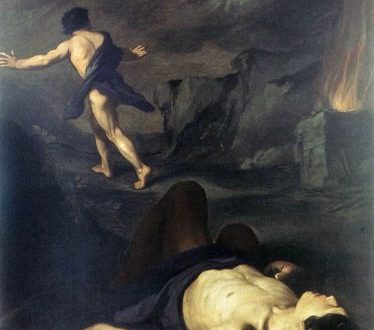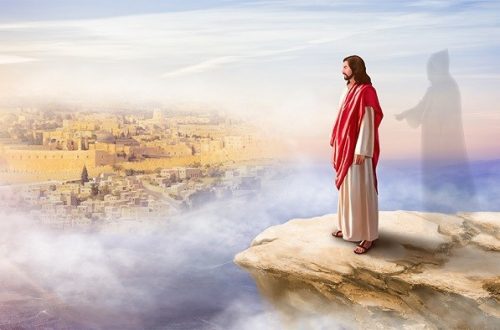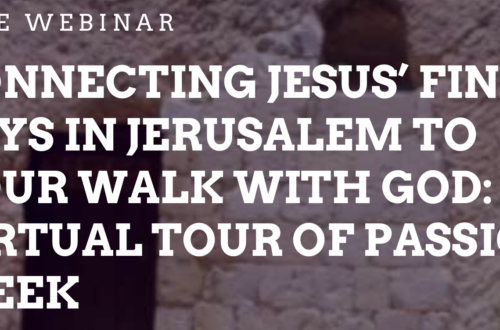Moses, a gifted but flawed leader of God’s people
Title: Moses, a gifted but flawed leader of God’s people
Aim: To recognize that living for the Lord requires unwavering commitment, self-control, and humility.
Scripture: Numbers 20:1–13
Discord among the Israelites, Numbers 20:1–5
Most likely, the reference to the “first month” (Num. 20:1) is in relation to the spring of the fortieth year of the Israelites’ wanderings in the wilderness. It was at that time that Aaron died (20:22-29; 33:38).
Also, by then most of the Hebrews who were at least 20 years old when the Lord freed them Egypt, had died (14:20-25). They were replaced by a new generation of God’s people to begin the next stage of His plan for the covenant community, namely, the conquest and settlement of Canaan.
Numbers 32:10-13 recounts the tragic episode that resulted in the Lord’s judgment decades earlier. Moses reminded a new generation that the Creator would not be silent concerning the tribes’ disobedience.
Moses described to the tribal leaders God’s reaction when their parents had refused to enter Canaan. Then, the lawgiver explained how the Lord had grown angry and had vowed that the Exodus generation would not see the land He had promised to the nation’s patriarchs (v. 10-11).
The only exceptions to God’s vow were Caleb and Joshua, because they “wholeheartedly followed” (v. 12) the Creator and spoke against the rebellion. The Lord kept His oath, for during the 40 years of wandering in the desert, all the insurrectionists perished (v. 13).
Much of what took place during those dreary decades is passed over without comment in the biblical record. Undoubtedly, there wasn’t much of significance that occurred in relation to the advancement of God’s redemptive program.
The Hebrews would have traveled from one place to the next. They also established camp wherever they found adequate amounts of water and possibly meager amounts of vegetation.
Of course, the Lord kept the people alive by His generous provision of manna. Perhaps now and then over those long years, the covenant community would circle its way back to Kadesh Barnea, the spot where they first rebelled against the Creator (Deut. 2:14).
According to Numbers 20:1, the new generation of Israelites established camp one final time at Kadesh. This oasis of several springs in the Desert of Zin was located south of Canaan and within relatively close proximity to the river of Egypt (that is, the Wadi el-Arish; Num. 34:4-5; Ezek. 47:19; 48:28). The Desert of Zin was situated on the western fringe of the Sinai Plateau, as well as adjacent to and north of the Desert of Paran.
The entire region was a dry and inhospitable place. The topography included barren mountain cliffs, rock-covered valleys, and sandy dunes. Aside from the infrequent wadi, the region had little water and vegetation. Only the hardiest of desert plants survived the arid climate (for example, salt-loving bushes and acacia trees found in the beds of the wadis).
Numbers 20:1 notes that while the second generation of Israelites were encamped at Kadesh (possibly for several months), Miriam, the older sister of Moses (Num. 26:59; 1 Chron. 6:3), passed away and was buried there. She is first mentioned in Scripture in the episode involving the infant Moses and the daughter of Pharaoh (Exod. 2:1-10).
Moses’ Levite parents, Amram and Jochebed, had at least two children—Miriam and Aaron—when they became parents of Moses (6:20; 15:20). Miriam is also mentioned in the celebration that occurred after the Lord safely brought the Israelites through the Red Sea (15:20-21). At this time, Miriam must have been in her nineties, since she was a young girl when Moses was born (and Moses was now in his eighties).
Numbers 12 recounts the challenge to Moses’ leadership from Aaron and Miriam (Deut. 24:9). Moses’ siblings opposed him because he had married a Cushite (Nubian), but jealousy over his leadership was probably what motivated their criticism. God warned them against opposing His bondservant and struck Miriam with leprosy.
Then, for seven days, Miriam was shut out of the Israelite camp. After God healed Miriam’s leprosy, the first generation of Israelites continued their journey toward Canaan. Despite Miriam’s shortcomings, she played a constructive and influential role in the formative years leading up to the Israelite conquest of Canaan.
Nearly 40 years later, while the second generation of Israelites were encamped at Kadesh, their supply of water ran out. Like their renegade parents, the community, feeling unsettled, “gathered in opposition” (Num. 20:2), which means they rebelled against Moses and Aaron. Moses, however, was the primary target of the people’s grievance, which they framed as a legal complaint or lawsuit against him.
The agitators quipped that it would have been better for them to die in front of the tabernacle, 40 years earlier, with the original cohort of Israelites who left Egypt (v. 3), and whom God previously had struck down in judgment (14:22; 16:31-35). The present generation of ingrates asked why Moses led the entire covenant “community” (20:4) into the “wilderness.”
Was it, as the riffraff suggested, so that they would perish in the desert, along with their livestock? More generally, the malcontents asked why Moses would bring them out of Egypt to such a dreadful place where virtually nothing grew. Indeed, in the absence of water, the region was barren of such produce as grain, figs, grapes, and pomegranates (v. 5).
It is noteworthy that almost four decades earlier, the previous generation of Israelites also complained to Moses about the lack of water at Repidim (Exod. 17:1-2). The lawgiver, being frustrated by the people’s lack of faith, responded by asking the Israelites why they constantly wanted to test the Lord.
In response, the people of that doomed cohort turned their complaint back to Moses, apparently refusing to concede that their quarrel was actually with the Lord. Once more, they demanded to know why Moses had led them into the wilderness to die of thirst (v. 3).
Moses, though perplexed by the short memory of the antagonists, cried out to the Lord (v. 4). God told Moses to take some of Israel’s elders with him and leave the crowds behind.
Moses was to walk to nearby Horeb, where he had earlier encountered the burning bush, and strike a particular rock with his staff. God promised that when Moses did so, enough water for all the people would come out of the rock (v. 5-6).
As the elders watched, Moses struck the rock, and water began gushing out of it. Because the people argued with Moses and tested God at that place, Moses called the site Massah, which means “testing,” and Meribah, which means “quarreling” (v. 7).
Moses disobeys the Lord, Numbers 20:6–13
Like the first generation of Israelites the Lord led out of Egypt, the second generation pummeled Moses and Aaron with a litany of peevish, heated complaints. Moses and Aaron responded by turning away from the agitators.
Next, Moses and Aaron walked toward the entrance of the tabernacle. Then, the two threw themselves down with their faces to the ground, and the Lord’s glorious presence was manifested before them (Num. 20:6; see Exod 19:9, 16; 33:9–10; Num 9:15).
God commanded Moses to pick up his staff and assemble the covenant community (Num 20:7-8). Then, in the sight of the entire gathering, Moses was to speak to a nearby rock.
When the lawgiver did so, the Lord promised that water would gush out of the rock. In fact, so much water would be produced that it would supply enough to satisfy the drinking needs of the entire community and their livestock (Ps. 114:8).
First Corinthians 10:1-5 refers to this and other episodes from Israel’s years of wandering in the desert to depict the Messiah as the spiritual rock of God’s people. Previously in his letter, Paul had warned the Corinthians not to engage in idolatry. Specifically, he had discussed eating food sacrificed to idols (chap. 8).
In chapter 10, the apostle used illustrations from Israel’s exodus from Egypt and wandering in the Sinai wilderness to show what overtakes people who reject God by succumbing to idolatry. The first generation of Israelites whom Moses led out of Egypt had unparalleled opportunities to witness the majesty of God and grow strong in their faith.
In an extraordinary act of deliverance, the Lord led them all through the Red Sea. Each day they received divine guidance from the cloud that went before them (v. 1). The abiding presence of the cloud indicated that the Hebrews were under the Creator’s leadership and guidance (Exod. 13:17–14:31).
Through those events that Exodus generation became identified with Moses. Being in a sense “baptized into Moses” (1 Cor. 10:2), the Israelites were under the submission of this aged leader in a way similar to the manner in which believers are submitted to the Messiah through baptism.
Furthermore, God miraculously fed the Israelites every day with manna (Exod. 16; 1 Cor. 10:3). On more than one occasion, He caused water to gush from rocky formations to satisfy the multitude and their livestock (Exod. 17:1-7; Num. 20:1-13).
The people understood that they were eating and drinking out of God’s merciful and loving hand. The manna and gushing rock represented the grace that would appear fully and personally in Jesus of Nazareth, the Rock (1 Cor. 10:4). Put another way, our crucified and risen Savior was the one who provided deliverance for the Israelites.
Regrettably, though, the Exodus generation did not live up to its heritage. Most of these Hebrews died in the wilderness because they rebelled against God, provoking His displeasure and judgment against them (v. 5).
Possibly some Corinthian believers assumed they could get away with certain sins, such as idolatry (v. 14), because they had been baptized and were participating in the Lord’s Supper (v. 16-17). That would explain why Paul wrote as he did, describing long-ago events in terms of the two Christian sacraments.
The apostle was warning his readers that baptism and holy communion would not automatically protect the Corinthians from God’s judgment, just as the miracles He performed at the Red Sea and in the Sinai wilderness did not shield the Israelites from destruction (v. 21-22). If the believers at Corinth were astute, they would flee idolatry (v. 14).
It was not enough for Paul’s readers to know that idolatry was wrong. They had to intentionally run away from it. The apostle was urging not only weak Christians to abandon this sin, but also believers with strong consciences whose actions might cause their more self-doubting peers to spiritually stumble.
Returning once more to the main narrative recorded in Numbers 20, just as the Lord directed, Moses went and picked up his staff (v. 9). It was stored at the tabernacle, where the Lord manifested His sacred “presence.”
Based on the preceding information, some think the staff was the budding and blossoming rod of Aaron that produced almonds (17:6–13). Another option is that the item was Moses’ personal rod, which he previously used to strike the waters of the Nile (Exod 7:19–20), as well as to strike a rock in a previous complaint episode involving the first generation of Israelites (17:1–7; recounted in the section above).
In any case, Moses and his brother, Aaron, summoned the second generation of Israelites to gather around the designated “rock” (Num 20:10). What followed deviated from God’s original command recorded in verse 8.
Moses, in particular, allowed four decades of pent up frustration to prompt him to speak rashly in a moment of anger (Ps. 106:32-33). He chided this new cohort of God’s people for being a group of “rebels” (Num. 20:10).
Moses then upstaged God—who alone has the right to act as Judge over His people (Matt 7:1–5; Jas 4:11–12)—by asking whether it was necessary for the lawgiver and his brother to somehow get water to come out of the rock in front of the assembly. Then, in a violent act of indiscretion, Moses raised the staff and, instead of just speaking to the rock (Num 20:8), used his rod to pound the rock two times (v. 11). Despite Moses’ flagrant violation of God’s instructions, a large stream of water came out abundantly from the rock, enabling all the people and their livestock to drink.
Instead of trusting that the Lord’s will was appropriate and good, Moses had openly violated it. In doing so, the lawmaker, in partnership with Aaron, had offended the Lord, debased His holiness, and failed to credit the miracle that occurred to Him.
The Hebrew verb qadash, which is rendered “holy” (v. 12), means “to be separate,” “to be distinct,” or “to set apart.” As Leviticus 11:44 reveals, God is incomparable in His majesty and absolutely pure in His moral virtue. Yet, tragically, when Moses acted in a rash and violent manner, he left the covenant community with the false notion that God is temperamental, fickle, and pugnacious—in other words, as emotionally flawed as human beings.
Moses and Aaron, by not displaying sufficient reverence for God in the presence of the second generation of “Israelites” (Num. 20:12), were forbidden from leading the covenant community into Canaan. This outcome serves as reminder that not even a person as great as Moses was exempt from the Lord’s discipline. As noted earlier, among the original cohort of Hebrews who had experienced the exodus from Egypt, only Joshua and Caleb were permitted to enter the land the Creator had promised to give to the descendants of the patriarchs.
The “waters of Meribah” (v. 13) became the name of the place where the Israelites argued with the Lord, and where His holiness was demonstrated and maintained among the people (for example, by judging Moses and Aaron). As noted earlier, the Hebrew noun rendered “Meribah,” which is used in both Exodus 17:7 and Numbers 20:13, means “quarrelling.” It can also convey the notions of complaining, strife, and contention.
In reflecting on this historic incident, Psalm 95:8 exhorted later generations of God’s people not to harden their hearts as the second Exodus generation did “at Meribah.” Even in such a regrettable situation such as this, the Lord proved Himself to be holy and maintained His honor in the presence of the entire covenant community (Lev. 10:3).
For thought and application
As stated above, 1 Corinthians 10:1-5 makes reference to Numbers 20:1-13 and other episodes from Israel’s years of wandering in the desert to depict the Messiah as the spiritual rock of God’s people. Regrettably, though, most of this privileged generation—including Moses and Aaron—fell short of living up to its sacred heritage.
Virtually every day we must choose between earthly and heavenly wisdom. Our culture pressures us to follow popular heathen ideas and habits, even though these are contrary to the directives of God recorded in His Word. Choosing the Creator’s wisdom means believing that He is holy, wise, and good. It also means believing He knows what is best for us.
Yes, we sometimes make mistakes and fail to follow God’s will, as Moses and Aaron did that fateful day thousands of years ago at Kadesh Barnea. We presume that we can upstage the Lord in discerning what is best for us.
James 3:14-16 explains that envy and ambition often lead us to make unwise choices. When we do so, the devil wins another round in the ongoing spiritual battle.
The Creator does not publish His wisdom in huge neon signs. Instead, finding God’s wisdom comes from the study of Scripture, in conjunction with faithful prayer, worship, and fellowship. When we walk closely with the Lord, we sense Him directing us down the right path.
Considering the preceding observations, what might be some of the lessons we have learned the hard way? What stories could we tell about how we suffered because we thought we knew better than the Lord and ended up giving less than our best?
It is humbling to admit that we blew it because we were too proud and stubborn to heed the wisdom of God’s Word, along with considering a fellow believer’s sage advice. Nevertheless, how thankful we are that God often delivers us from our follies.
Also, how wonderful it is to tell others about the Lord’s grace. We should mention not just our mistakes, but also the Savior’s goodness and compassion.
Imagine Moses and Aaron acknowledging their misdeed to their Israelites peers and thanking God for having mercy them. Now that would send a powerful and unforgettable message!



